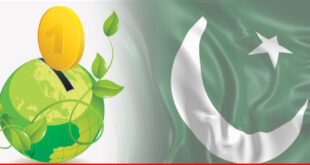Deposit mobilization had been much easier in Islamic banking in Pakistan
About 40 years ago, Islamic Finance was started to cater the needs of faith-based Muslims. Once looked at in the Arabian Gulf and Malaysia, the Islamic Finance market is evolving into a global one now. In the last decade, the Islamic Financial Sector has registered a growth of 20% per year, indicating it as one of the fastest growing segments of the overall financial system. Now Islamic Finance has its roots expanded to Muslim as well as non-Muslim economies.
Currently, over 1,400 institutions are offering Islamic Financial Services having operating across the globe providing a solid platform for future development of the Islamic Finance Industry.
In Pakistan, the initiative to introduce Islamic Banking in Pakistan was launched in 2001 when the government decided to promote Islamic Banking in a gradual manner and as a parallel and compatible system that is in line with best international practices. Up till now, the growth of Islamic Banking Industry in Pakistan is remarkable.
It may be noted that a report recorded 23.3 per cent year-on-year growth in deposits of Islamic Banking Industry to Rs1.070 trillion in 2014. The industry’s deposits stood at Rs868 billion in 2013. Presently, there are 22 Islamic banking institutions operating in the country. Of which, five are full-fledged Islamic banks and 17 conventional banks with 1,574 Islamic banking branches. Conventional banks manage 929 Islamic windows nationwide. The market shares of Islamic Banking assets and deposits were recorded at 10.4 per cent and 11.6 per cent, respectively as of December 31, 2014.
Analysts who are in favor of Islamic Finance told PAGE that deposit mobilization had been much easier in Islamic Banking in Pakistan as compared to using the deposits to provide finance. Islamic banks with assets backed financial products rely much more on formal documented manufacturing-based industries where finance is required for plant and machinery, raw material and industrial equipment.
On the other hand, there are some issues to Islamic banks. First, Islamic banks in Pakistan have limited product range for firms that require finance in already ongoing projects in which lumpy investments had been made, but financing is required to meet rising variables costs of energy and utility expense. Over-reliance on debt based modes of financing requires firms to take initiative and increase their demand for such products from Islamic banking. Hence, the supply side response by Islamic banks is hindered and they may remain ineffective in bringing an economy out of recession by providing less restricted and flexible modes of financing like Mudarabah and Musharakah. However, Islamic banks in Pakistan seem to be content with surplus liquidity. Instead of using the deposits by providing finance, they had increased investments. This has resulted in an FDR ratio of as low as 34 per cent in recent months. This undermines their function of financial intermediation between firms and households.
Growth and advancement
Analysts believe that growth rate of Islamic Banking is higher than the conventional banks and Pakistan has enough room for the Islamic Banking. They were of the view that general insurance should also be included in the domain of Islamic Banking. They stressed that all stakeholders should struggle collectively for the promotion of the Islamic Banking.
They insisted that small loans should be provided through the Islamic Banking in small business, agricultural and energy sector especially solar energy.
The Pakistani Islamic Banking industry, particularly, Meezan Bank has made notable efforts and progress. In the year 2013, Meezan Bank was recognized as the ‘Best Research & Development’ institution by the Global Islamic Finance Awards. This achievement goes onto show the support of the central bank, which has led Meezan Bank as being referred to, a benchmark of Shariah compliance in both local and global Islamic Finance Industry, an official of the bank said.
Financial experts said the government is encouraging Islamic Finance in the country. The central bank has already revised down the paid-up capital requirement for Islamic banking subsidiaries to six billion rupees from Rs10 billion. However, Islamic banks get less return on investments in sukuks as compared to conventional banks in market treasury bills, they added.
They believe that Shariah-compliant lenders could accumulate more deposits if they obtain better returns on investments.
Islamic banking has proved over time that it is based on firm and sound economic principles and has a good potential for become an alternative system of banking especially in view of the global financial crises. However, there is a need for dedicated research and measures from the government to develop a sound legal and regulatory framework for Islamic financial industry. Attempts should be made to modify the existing structure to provide better products and quality service within the ambit of Islamic laws.
While interest-based banking has taken hundreds of years to mature to the level where it is today, expecting the same maturity from Islamic banking in its nascent stage will be expecting too much. To develop an economic system truly reflective of the sacred principles of Islam, all stakeholders should understand the limitations at this stage and work towards its advancement.
 PAGE Blog Business Weekly Magazine
PAGE Blog Business Weekly Magazine

